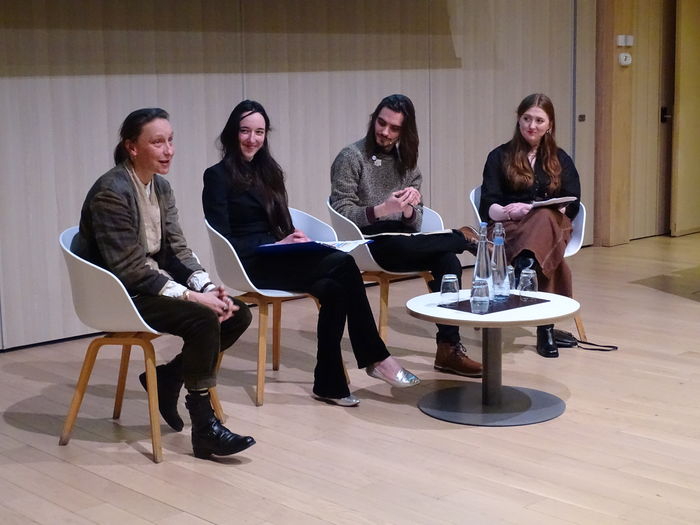Revitalising the British romcom with Rye Lane
Raine Allen-Miller’s debut is an effortless tribute to London and to love that deserves its Sundance plaudits and more

As audiences, we’re well attuned to the trappings of formulae when it comes to the romcom, not least the oh-so-familiar staple of the ‘meet cute’. Julia Roberts catches Hugh Grant’s eye across a bookshop in Notting Hill, Meg Ryan and Billy Crystal bicker on a cross-country car ride in When Harry Met Sally, and Katherine Hepburn mistakenly hits Cary Grant’s golf ball instead of her own in Bringing Up Baby; however strange and unlikely the initial encounter, there’s never any doubt that Cupid has hit his target.
“The film feels like a defiant kick up the backside for a genre rendered increasingly tired by cash-ins and contrivance”
In Raine Allen-Miller’s acclaimed first feature Rye Lane, we’re no less certain of the end destination... even as the film’s ‘meet cute’ seems determined to flout any notions of romantic glamour. We open with a bird’s eye view of a set of cubicles in a public bathroom, the camera panning over a kissing couple, a gaggle of teenage girls taking selfies and a drunken afternoon chunder before it lands on our protagonist, Dom (David Jonsson). He’s not having the best day. In fact, he’s not had the best few months, since his girlfriend of six years ended things. It’s so raw that he still calls it the breakup… but, then again, that’s probably because she cheated on him… with his best friend. His not-so-private sobs are overheard by Vivian Oparah’s unapologetically forward Yas; although he initially rebuffs her sympathies, he soon discovers that she too is riding the post-breakup train (latest stop: Crying-In-A-Public-Toilet-upon-Thames). Comedic hijinks reliably ensue along the way, as the two opt to help each other in their shared pursuit of closure, a quest that comes, in turn, with the promise of new romantic beginnings.
In the fashion of Richard Linklater’s Before trilogy, Rye Lane is set largely over the course of a single day and, in a mere 82 minutes, manages to imbue vivacious new life into the romcom. Unwilling to settle with wagging a finger at whatever lazy, A-list-fronted fare has hit Netflix that given week (I’m looking at you, Murder Mystery 2), the film instead feels like a defiant kick up the backside for a genre rendered increasingly tired by cash-ins and contrivance. Rye Lane takes every ingredient of the typical romcom, even assembling them in a manner that might play as narratively predictable; but it’s executed with such flair that it feels as if Allen-Miller has gifted us something truly and joyously fresh.
We watch Yas and Dom’s courtship play out against the scenic backdrop of a sunny South London; they wander through the bustling streets of Peckham, Brixton and the South Bank, sharing burritos (purchased from the knowingly styled ‘Love Guac’tually’, one of many gags met with raucous guffaws from my full cinema audience), discovering a shared penchant for Salt-N-Pepa (in one of the film’s best sequences, it seems to tease the idea of becoming a musical) and discussing life, love and everything in between. They’re not a natural pairing; he’s awkward and introverted, where she wears (if only the guise of) confidence firmly on her sleeve. But, the two are played with such genuine honesty by Jonsson and Oparah that you never once doubt that they might fall for each other. The actors are surely stars in the making, perfectly matching the tenor of Nathan Bryon and Tom Melia’s brisk script, which moves with a well-oiled ease through moments of both comedy and poignancy.
There is none of the potential stylistic awkwardness of a first feature to Allen-Miller’s direction; aided by Victoria Boydell’s razor-sharp editing and Kwes’ hip-hop inflected score, she paints upon a kaleidoscopic cinematic canvas, extended tracking shots of colourful London locales interchanging with absurdist forays into Dom and Yas’ memories, as they regale each other with dramatic accounts of their respective breakups. The use of an ultrawide fish-eye lens throughout the film (an angle for which, I must confess, I have always had a personal distaste) reflects a distinct attentiveness paid to the world around the central pair. As much as our emotional focus remains upon them, our eyes are constantly being drawn to the lives of others they only barely notice along the way — street vendors, fellow bus passengers, playing children. If Dom and Yas face a few stumbling blocks in their road to romantic union, there’s no such trepidation in Allen-Miller’s love for London, presented here not in the narrow orbit of romcoms of old (i.e. where everyone somehow manages to look like Hugh Grant), but in all its mad, multicultural glory.
We need more films like Rye Lane, from artists able to take the smallest and most unremarkable of stories on paper, yet execute them with real style, wit and energy on-screen. I came out of the cinema basking in the song, the colours and the deep love and appreciation for both face and space; it’s as if the entire film has swallowed the sun.
 News / Cambridge study finds students learn better with notes than AI13 December 2025
News / Cambridge study finds students learn better with notes than AI13 December 2025 Features / Should I stay or should I go? Cambridge students and alumni reflect on how their memories stay with them15 December 2025
Features / Should I stay or should I go? Cambridge students and alumni reflect on how their memories stay with them15 December 2025 News / Uni Scout and Guide Club affirms trans inclusion 12 December 2025
News / Uni Scout and Guide Club affirms trans inclusion 12 December 2025 News / Cambridge Vet School gets lifeline year to stay accredited28 November 2025
News / Cambridge Vet School gets lifeline year to stay accredited28 November 2025 Comment / The magic of an eight-week term15 December 2025
Comment / The magic of an eight-week term15 December 2025









